The fog seemed to foreshadow Joni Mitchell as it rolled in, surrounding the peninsula housing the War of 1812-era Fort Adams that makes up the venue of the Newport Folk Festival, after a weekend of intense sun and heat. There had been whispers all weekend about special guests; rumors of Paul Simon, Paul McCartney, Jimmy Buffett, and Joni were all floated in the crowd. In Joni’s case, when the physical schedule on-site was changed to reflect a “Coyote Jam” after Brandi Carlile and friends, it became apparent that it would be Joni Mitchell-focused, though it was still unclear if the honored musician would show. The Simon and Mitchell murmurs turned out to be correct, slightly blunting the surprises, their appearances still prompted uproars, and, in the case of the latter, weeping among many in the crowd.
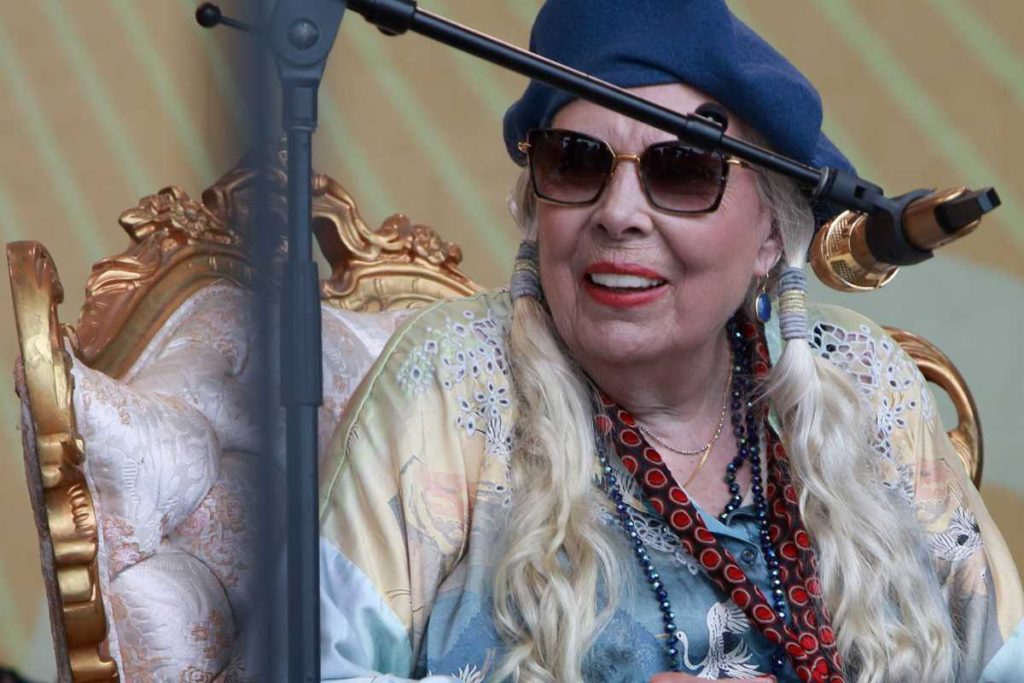
For her part, Mitchell sounded great, playing guitar in public for the first time in almost a decade on an instrumental version of “Just Like This Train.” Her singing range may have compressed and deepened but her phrasing and the conviction of her lyrics came through clearly. For her own songs, she sang along with the artists assembled to pay tribute. Carlile led many of the vocals, as did Dawes’ Taylor Goldsmith. Other highlights included Celisse, who sang “Help Me.” Joni had some fun, taking the low part at the tail end of “Big Yellow Taxi.” These songs alternated with Joni’s favorite covers, resulting in what was termed “the Joni jam” by Brandi. Mitchell sang lead on “Love Potion #9,” a “Summertime” that took its time, and “Why Do Fools Fall In Love?”
Joni was just one highlight of a sunburned weekend of music—so many so that it would have been impossible for one person to have caught all of the sets one wished to (and necessitating a review with some gaps in it, as I couldn’t be at all five stages at all times). Arooj Aftab, Pakistani composer and vocalist, brought a large band with her, playing trotting, polyrhythmic, mostly instrumental music. The Felice Brothers delivered on their upstate New York mountain jangle in a set that mixed newer singles like “Cherry Licorice” with old favorites like “Whiskey In My Whiskey,” the latter of which saw the crowd joining in. James Felice impressed with his accordion playing.
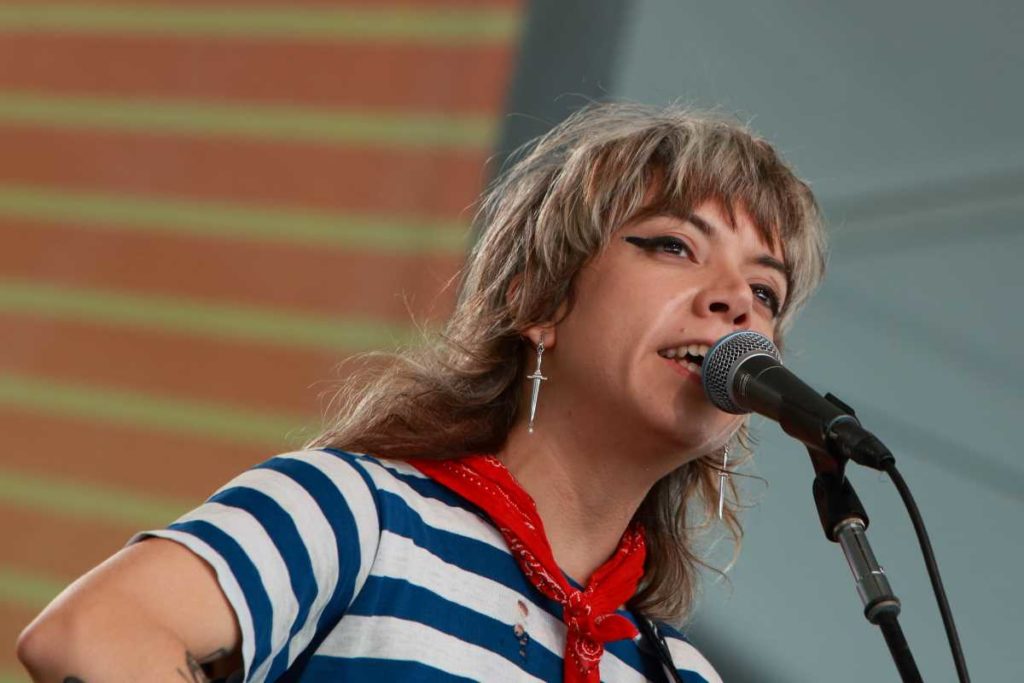
Hurray For The Riff Raff appeared as a duo, allowing Alynda Lee Segarra’s lyrics of outrage, love, togetherness, hope and change to soar. She was one of several performers who called out the oppression brought on by the overturning of Roe v. Wade. Lucy Dacus, reliably great, appeared at the Fest for her fourth time, on the main stage this round, and brought a radio-friendly sound but still full of her observant lyrics and hooky, catchy songs. Blake Mills recalled Bill Frisell or Marc Ribot and married jazz with art-rock and roots music in a burst of creativity.
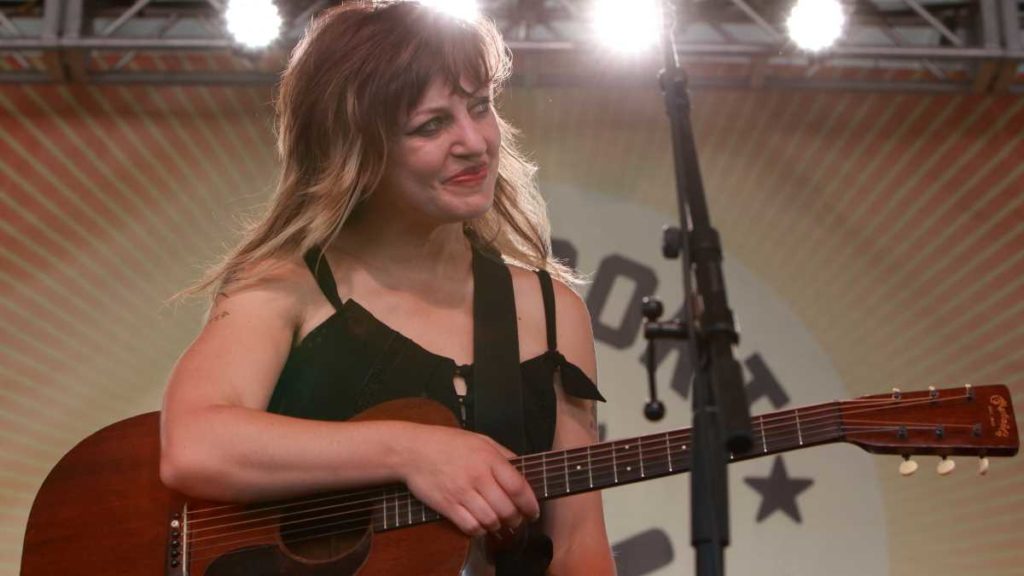
Anais Mitchell, who was set to appear with Bonny Light Horsemen (the band had to cancel last-minute), was in top narrative form, both in her songs and her between-song stories. The Roots didn’t stop, moving from motif to motif and groove to groove, quoting and building on a century of black music in a high-energy set. Hermanos Gutierrez, both brothers seated, let their guitars bring forth the melodies and syncopation in a superb set. Cassandra Jenkins allowed herself to be vulnerable in her engaging indie-rock songs.
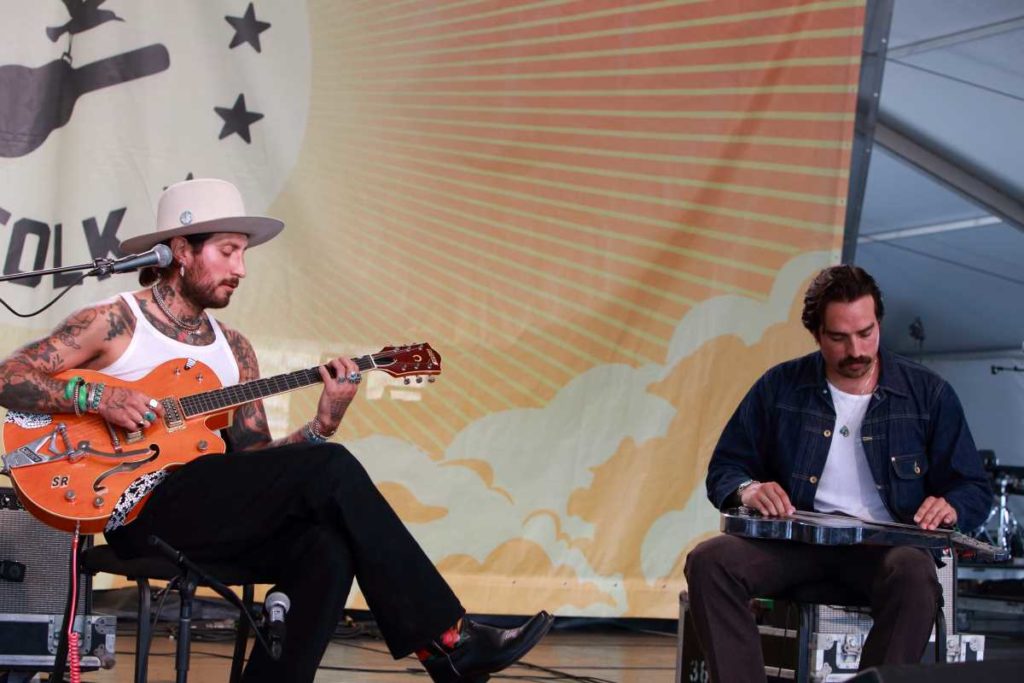
That feeling that you could discover something new and delightful that becomes a fest favorite was heightened by the addition of two new stages. Though the fest subtracted the indoor Museum Stage, it added the Foundation Stage (for lower-volume sets in between those on the main stage) and Bicycle Stage (more electric, powered by five stationary bicycles, for while the Quad Stage was re-set, inside the fort walls). S.G. Goodman appeared at the latter, playing her vintage Guild semi-hollowbody electric backed by a guitarist with a reverb-drenched Fender Jaguar in a highlight of the weekend. She thanked those cycling in the heat for keeping the power flowing and joked in her Kentucky drawl that if this was a folk family, she wanted to find the parental figures because she was broke. Her singing was mesmerizing. Meanwhile, JP Harris played at the new Foundation Stage. He stuck mostly to old-time music, wearing a Doc Watson t-shirt, playing Bascom Lamar Lunsford’s mountain song “Mole In The Ground,” among others. He then welcomed Riley Downing of the Deslondes to duet on a Blaze Foley song. The sets at this stage brought back some of the traditional folk songs and sounds that has seemed lacking in the fest the past few years.
The blues had a strong showing at this year’s festival. If, as Dr. Cornel West says, the blues came about in spite of the oppression, not because of it, and thereby demonstrates how one deals with living in an absurd world with cruelty never far away, all three performers put their spins on that core blues ethos.
Adia Victoria and her band took command of the stage with a powerful set of mostly original songs. Victoria’s lyrics took a deep hold. She also spoke eloquently and passionately about the blues tradition and blues people, at one point shouting out a series of blues originators, particularly women, including Ma Rainey and “Bessie Davis.” (For the latter, one presumes she meant either Bessie Smith or Betty Davis or both.) Her band took great pains to steer far from postwar blues sounds, alternating blues/punk with more spooky sounds; the latter found Victoria’s voice turning a bit breathy and the band clicking on all of its guitar pedals, sometimes evocatively but occasionally to a distracting extent. Victoria welcomed her mother, whom she credited with introducing her to the power of this music and culture, along with Lizzie No and other members of the Black Opry to the stage to join her on a blues/punk version of Blind Willie McTell’s slide-guitar-driven “You Was Born To Die” (originally sung with Curley Weaver) that spit indignation.
Taj Mahal, surrounded on stage by a semi-circle of stringed instruments, brought a mighty groove, kicking things off on banjo before picking up a resonator guitar and later a ukulele; he fronted a quartet that followed his every move on both obscure blues classics and Taj favorites like “Fishing Blues” and “Lovin’ In My Baby’s Eyes.” He performed a song “I’m Wild About My Lovin’,” from the repertoire of Jim Jackson, that he introduced as over a hundred years old. He and his band gave it a slight reggae beat, reminding us that all music from the African diaspora worldwide is all related. The song does not rely on a 12-bar form and in this case this allowed them to keep that riveting bass line going a little longer in each verse, keeping it fresh and keeping dancers on their feet. Mahal connected the fest to several of its earlier eras, both via his own appearances spanning decades and that he learned directly at the fest from elders like Mississippi John Hurt and Son House. Things had come full circle, with Taj the master now. Musicians crowded the wings of the stage during his set.
Buffalo Nichols riveted with a solo performance on the Harbor Stage. His “Another Man” used a melody similar to that of Lead Belly’s “Alabama” as well as “Baby Please Don’t Go” to launch an intense reckoning of the changing forms of violent racism, comparing the lynchings of a century ago to police killings, the “self-defense” of so-called Stand Your Ground laws of some states that allow killing, and mass incarceration. “No need to hide behind a white hood,” he sang, “When a badge works just as good. Another man is dead.” It was deeply rooted in Louisiana blues, carrying the tradition forward with authority. Alongside his own songs, Nichols also performed Skip James “Washington D.C. Hospital Center Blues,” abandoning the falsetto of the original for more of a gruff, Delta-based vocal but lacking none of the pathos. In between songs, he spoke out against fascism in America. Throughout, his stomping foot provided the backbeat under his deeply-felt slide guitar.
Clusterfolk, a group set in the Quad stage inside the fort, brought together hastily when Bonny Light Horseman had to drop out, was charming, if scattered. Natalie Merchant appeared, to the delight of the crowd, the first surprise special guest of the weekend. Sarah Lee Guthrie sang an original song. Craig Finn, the next big-name surprise, followed with Nick Lowe’s “What’s So Funny About Peace Love & Understanding?” and Anais Mitchell sang a Don Henley song. Both artists sang well, but it begged the questions of why such superb songwriters were relegated to status of covers-bands playing classic rock radio favorites; and of why the cover songs chosen were such radio-favorites rather than songs from deeper in the folk or roots music traditions. (Side note: can we stop with the folk/fuck puns, now? It was funny and cheeky the first 1,000 times but it has overstayed its welcome at Newport.)
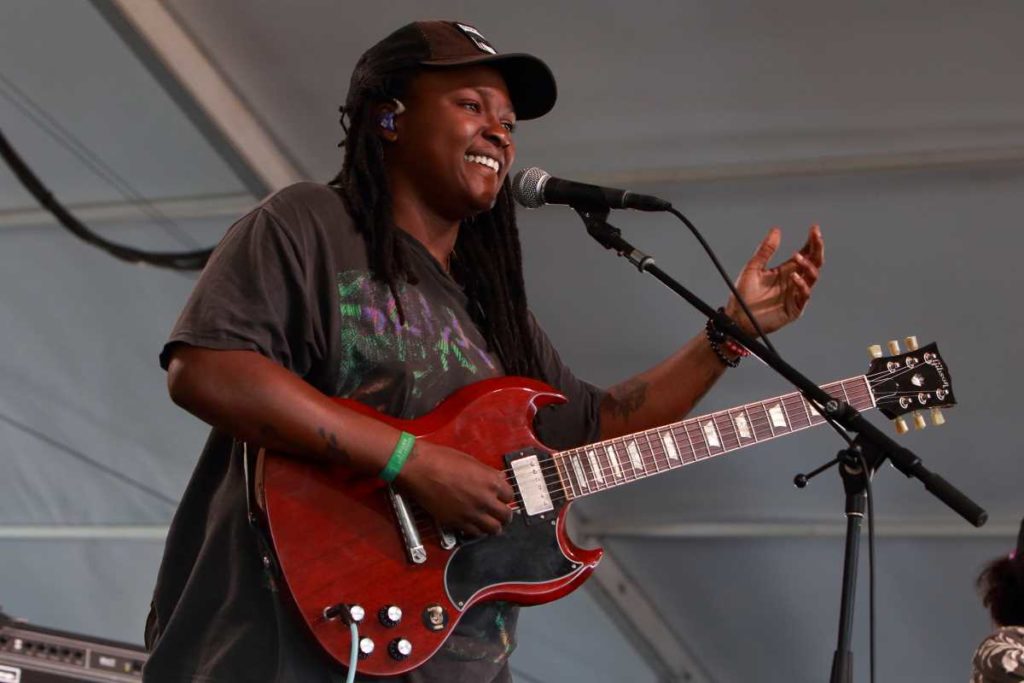
Another group set, The Black Opry set offered crescendo after crescendo leading to a standing ovation: Joy Oladokun sang an affecting song she wrote on the day she came out as gay; Chris Pierce sung his incredible “It’s Been Burning For a While” with an apropos fire but also with vulnerability; Julie Williams’ crossed country music and jazz in her beautiful vocals.
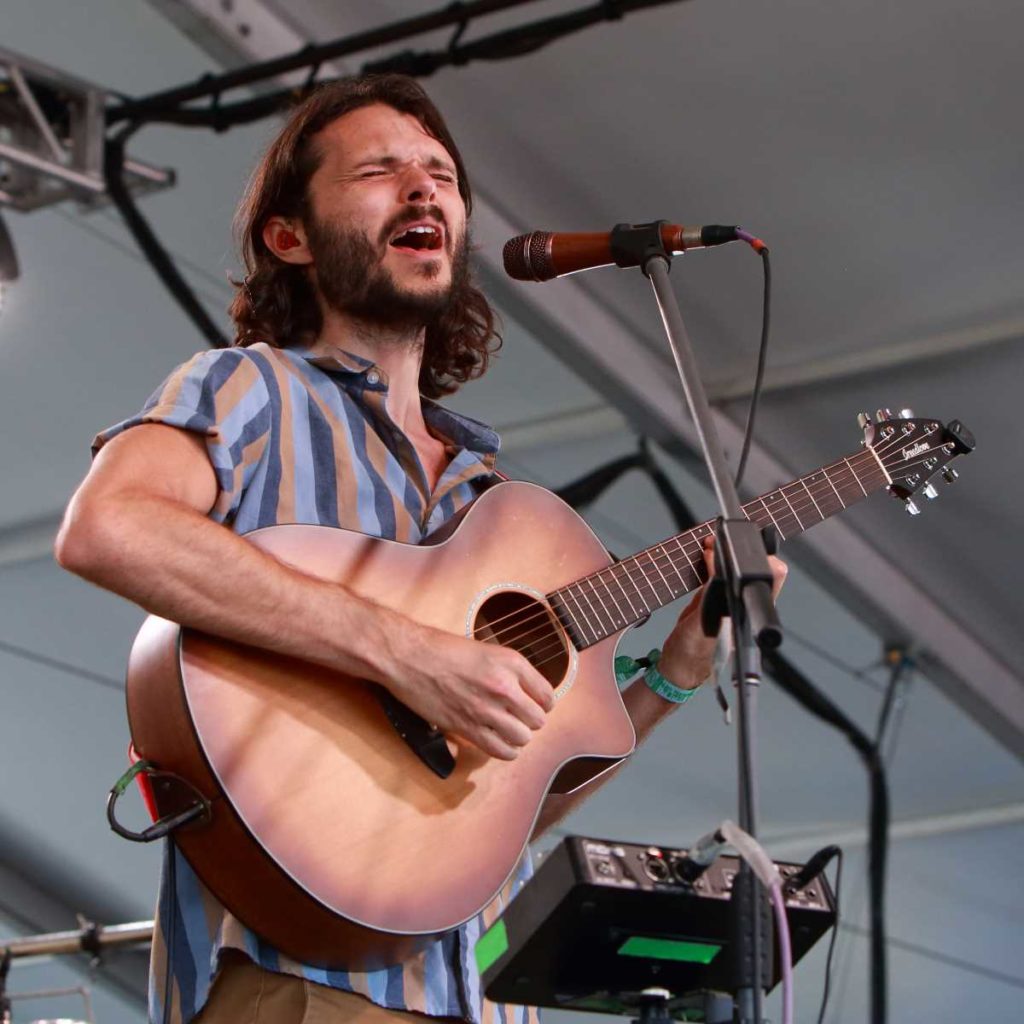
In a bid to become the new Phish, Goose jammed and got folks dancing, both inside the Quad Stage tent, outside the tent, and in the nearby Relix Magazine tent. Even as the definitions of folk music continue to broaden, Sylvan Esso seemed out of place at a festival with a giant wooden FOLK sign (seemingly designed with Instagram in mind) and a banner with a Pete Seeger quote. The band played an electro-pop set that doubled as the live debut of its new album ‘No Rules Sandy.’
While the fog brought Joni, it also allowed fans who hadn’t had a chance to get too close to the stages to see Japanese Breakfast up close. They had the misfortune of going up against Brandi and friends (and then Joni and friends) but that allowed the lucky few who converged on their set to come close. The band proved why folks are buzzing about them, with ineffaceable melodies and lyrics to match, charisma to spare, and astute use of dynamics; when the band got quieter, the audience came ever closer; then they played a louder song, it felt a release of tension. Michelle Zauner alternated guitar and keyboards, sometimes putting both down to concentrate on her singing while she darted all over the stage.
While the Joni performance was a shared triumph, Japanese Breakfast was no doubt was a high point to all who saw them. This dichotomy represents the magic of Newport, of collective, grand experiences but also of moments that feel like secrets, ushered in from the surrounding bay with sun or fog. As the crowd made its way to the parking lots or to the ferry lines, the fog stayed heavy and low, reinforcing that dreamlike feeling. Did we really just see that?!
All photos courtesy Suze Reviews the Blues
